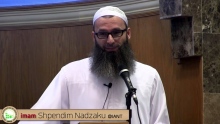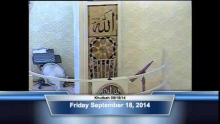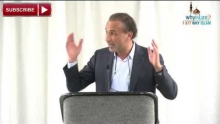Quran & Domestic Violence - Dr. Jonathan Brown
11 years ago
01:14:42
9,509 views
Misquoting Muhammad: The Challenge and Choices of
Interpreting the Prophet’s Legacy - Dr. Jonathan A.C. Brown
Verse in Question:
[[[[[ "Husbands should take good care of their wives, with (a) [the bounties] God has given to some more than others and with what they spend out of their own money. Righteous wives are devout and guard what God would have them guard in their husbands' absence. If you fear high-handedness (b) from your wives, remind them [of the teachings of God], then ignore them when you go to bed, then hit them. (c) If they obey you, you have no right to act against them: God is most high and great. If you [believers] fear that a couple may break up, appoint one arbiter from his family and one from hers. Then, if the couple want to put things right, God will bring about a reconciliation between them: He is all knowing, all aware." (Surat An-Nisā' (The Women) V34-35 - Muhammad Abdel-Haleem)
"If a wife fears high-handedness or alienation from her husband, neither of them will be blamed if they come to a peaceful settlement, for peace is best. Although human souls are prone to selfishness, if you do good and are mindful of God, He is well aware of all that you do." (Surat An-Nisā' (The Women) V128 - Muhammad Abdel-Haleem)
(a) bi is interpreted as instrumental rather than causal.
(b) The verb nashaza from which nushuz is derived means 'to become high', 'to rise'. See also verse 128, where the same word is applied to husbands. It applies to a situation where one partner assumes superiority to the other and behaves accordingly.
(c) This signifies a single blow, as is clear from the circumstances of the revelation of this verse. See also Abdel Haleem, Understanding the Quran, 46--54. ]]]]]
Jonathan AC Brown received his BA in History from Georgetown University in 2000 and his doctorate in Near Eastern Languages and Civilizations from the University of Chicago in 2006. Dr. Brown has studied and conducted research in Egypt, Syria, Turkey, Morocco, Saudi Arabia, Yemen, Indonesia, India and Iran. His book publications include The Canonization of al-Bukhari and Muslim: The Formation and Function of the Sunni Hadith Canon (Brill, 2007), Hadith: Muhammad’s Legacy in the Medieval and Modern World (Oneworld, 2009), Muhammad: A Very Short Introduction (Oxford University Press, 2011) and Misquoting Muhammad: The Challenges and Choices of Interpreting the Prophet's Legacy (Oneworld, 2014). He has published articles in the fields of Hadith, Islamic law, Sufism, Arabic lexical theory and Pre-Islamic poetry and is the editor in chief of the Oxford Encyclopedia of Islamic Law. Dr. Brown’s current research focuses on modern conflicts between Late Sunni Traditionalism and Salafism in Islamic thought.
Video Courtesy of: https://www.youtube.com/channel/UC0ejPCR_yMqnFUt43rXSGcQ
http://ext.instituteofknowledge.com/
Book: Misquoting Muhammad: The Challenge and Choices of Interpreting the Prophet's Legacy http://www.amazon.co.uk/Misquoting-Muhammad-Challenge-Interpreting-Prophets/dp/178074420X
Tags: Domestic Violence, Domestic Violence, Domestic Violence, Domestic Violence, Domestic Violence, Domestic Violence, Domestic Violence, Quran 4:34, Quran 4:34, Quran 4:34, Quran 4:34, Quran 4:34, Quran 4:34, Quran 4:34, Quran 4:34, Quran 4:34, Quran 4:34, Quran 4:34, Quran 4:34, Quran 4:34, Quran 4:34, Islam, Islam, Islam, Islam, Islam, Islam, Islam, Islam, Islam, Domestic Violence in Islam, Domestic Violence in IslamDomestic Violence in IslamDomestic Violence in IslamDomestic Violence in IslamDomestic Violence in IslamDomestic Violence in IslamDomestic Violence in Islam
Interpreting the Prophet’s Legacy - Dr. Jonathan A.C. Brown
Verse in Question:
[[[[[ "Husbands should take good care of their wives, with (a) [the bounties] God has given to some more than others and with what they spend out of their own money. Righteous wives are devout and guard what God would have them guard in their husbands' absence. If you fear high-handedness (b) from your wives, remind them [of the teachings of God], then ignore them when you go to bed, then hit them. (c) If they obey you, you have no right to act against them: God is most high and great. If you [believers] fear that a couple may break up, appoint one arbiter from his family and one from hers. Then, if the couple want to put things right, God will bring about a reconciliation between them: He is all knowing, all aware." (Surat An-Nisā' (The Women) V34-35 - Muhammad Abdel-Haleem)
"If a wife fears high-handedness or alienation from her husband, neither of them will be blamed if they come to a peaceful settlement, for peace is best. Although human souls are prone to selfishness, if you do good and are mindful of God, He is well aware of all that you do." (Surat An-Nisā' (The Women) V128 - Muhammad Abdel-Haleem)
(a) bi is interpreted as instrumental rather than causal.
(b) The verb nashaza from which nushuz is derived means 'to become high', 'to rise'. See also verse 128, where the same word is applied to husbands. It applies to a situation where one partner assumes superiority to the other and behaves accordingly.
(c) This signifies a single blow, as is clear from the circumstances of the revelation of this verse. See also Abdel Haleem, Understanding the Quran, 46--54. ]]]]]
Jonathan AC Brown received his BA in History from Georgetown University in 2000 and his doctorate in Near Eastern Languages and Civilizations from the University of Chicago in 2006. Dr. Brown has studied and conducted research in Egypt, Syria, Turkey, Morocco, Saudi Arabia, Yemen, Indonesia, India and Iran. His book publications include The Canonization of al-Bukhari and Muslim: The Formation and Function of the Sunni Hadith Canon (Brill, 2007), Hadith: Muhammad’s Legacy in the Medieval and Modern World (Oneworld, 2009), Muhammad: A Very Short Introduction (Oxford University Press, 2011) and Misquoting Muhammad: The Challenges and Choices of Interpreting the Prophet's Legacy (Oneworld, 2014). He has published articles in the fields of Hadith, Islamic law, Sufism, Arabic lexical theory and Pre-Islamic poetry and is the editor in chief of the Oxford Encyclopedia of Islamic Law. Dr. Brown’s current research focuses on modern conflicts between Late Sunni Traditionalism and Salafism in Islamic thought.
Video Courtesy of: https://www.youtube.com/channel/UC0ejPCR_yMqnFUt43rXSGcQ
http://ext.instituteofknowledge.com/
Book: Misquoting Muhammad: The Challenge and Choices of Interpreting the Prophet's Legacy http://www.amazon.co.uk/Misquoting-Muhammad-Challenge-Interpreting-Prophets/dp/178074420X
Tags: Domestic Violence, Domestic Violence, Domestic Violence, Domestic Violence, Domestic Violence, Domestic Violence, Domestic Violence, Quran 4:34, Quran 4:34, Quran 4:34, Quran 4:34, Quran 4:34, Quran 4:34, Quran 4:34, Quran 4:34, Quran 4:34, Quran 4:34, Quran 4:34, Quran 4:34, Quran 4:34, Quran 4:34, Islam, Islam, Islam, Islam, Islam, Islam, Islam, Islam, Islam, Domestic Violence in Islam, Domestic Violence in IslamDomestic Violence in IslamDomestic Violence in IslamDomestic Violence in IslamDomestic Violence in IslamDomestic Violence in IslamDomestic Violence in Islam


 English
English Български
Български No filter
No filter






